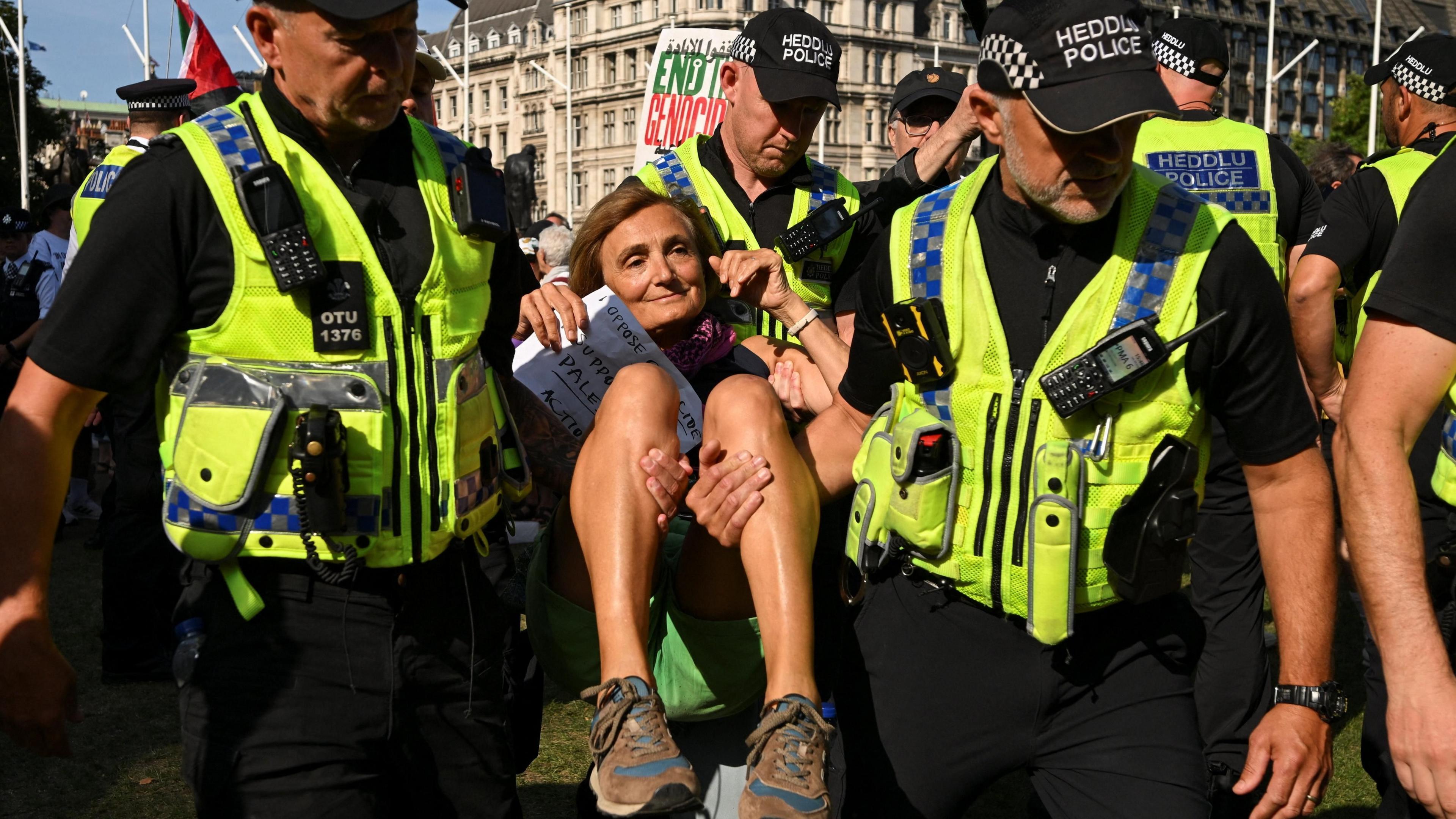More than 425 arrested at rally against Palestine Action ban in London
Police make arrests at Palestine Action protest in Parliament Square
- Published
More than 425 people have been arrested at a demonstration against the government's ban of the campaign group Palestine Action.
Hundreds gathered in Parliament Square in central London to oppose the group's proscription, some holding placards that read: "I oppose genocide, I support Palestine Action."
The Metropolitan Police said the majority of arrests were for supporting a proscribed organisation. More than 25 people were arrested for assaults on police officers and other public order offences.
The government proscribed Palestine Action under the Terrorism Act in July, making membership of or support of the group a criminal offence, punishable by up to 14 years in prison.
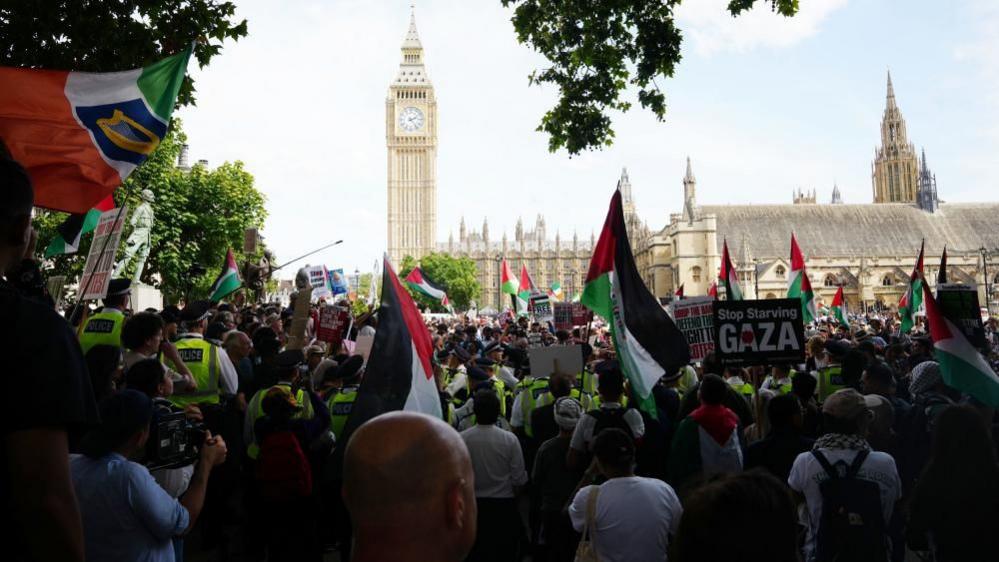
Organisers estimated around 1,500 people attended the protest
The Met said officers had been subjected to "an exceptional level of abuse" at the rally, including "punches, kicks, spitting and objects being thrown, in addition to verbal abuse".
The force said there had been a "coordinated effort to prevent officers carrying out their duties" and that anyone who assaulted an officer would be prosecuted "to the full extent of the law".
Defend Our Juries, which organised the rally, responded by saying officers had "violently assault[ed] peaceful protesters including the elderly, in order to try and arrest over a thousand people for holding cardboard signs".
It shared a video of a police officer shoving an elderly protester to the ground.
A spokesperson for the group had earlier said that "resistance to this ridiculous ban keeps on growing exponentially".
They added that the demonstration showed the Palestine Action ban was "impossible to enforce and a preposterous waste of resources".
The Met said the tactics used at the protest to "overwhelm the justice system... required significant resource which took officers out of neighbourhoods to the detriment of the Londoners who rely on them".
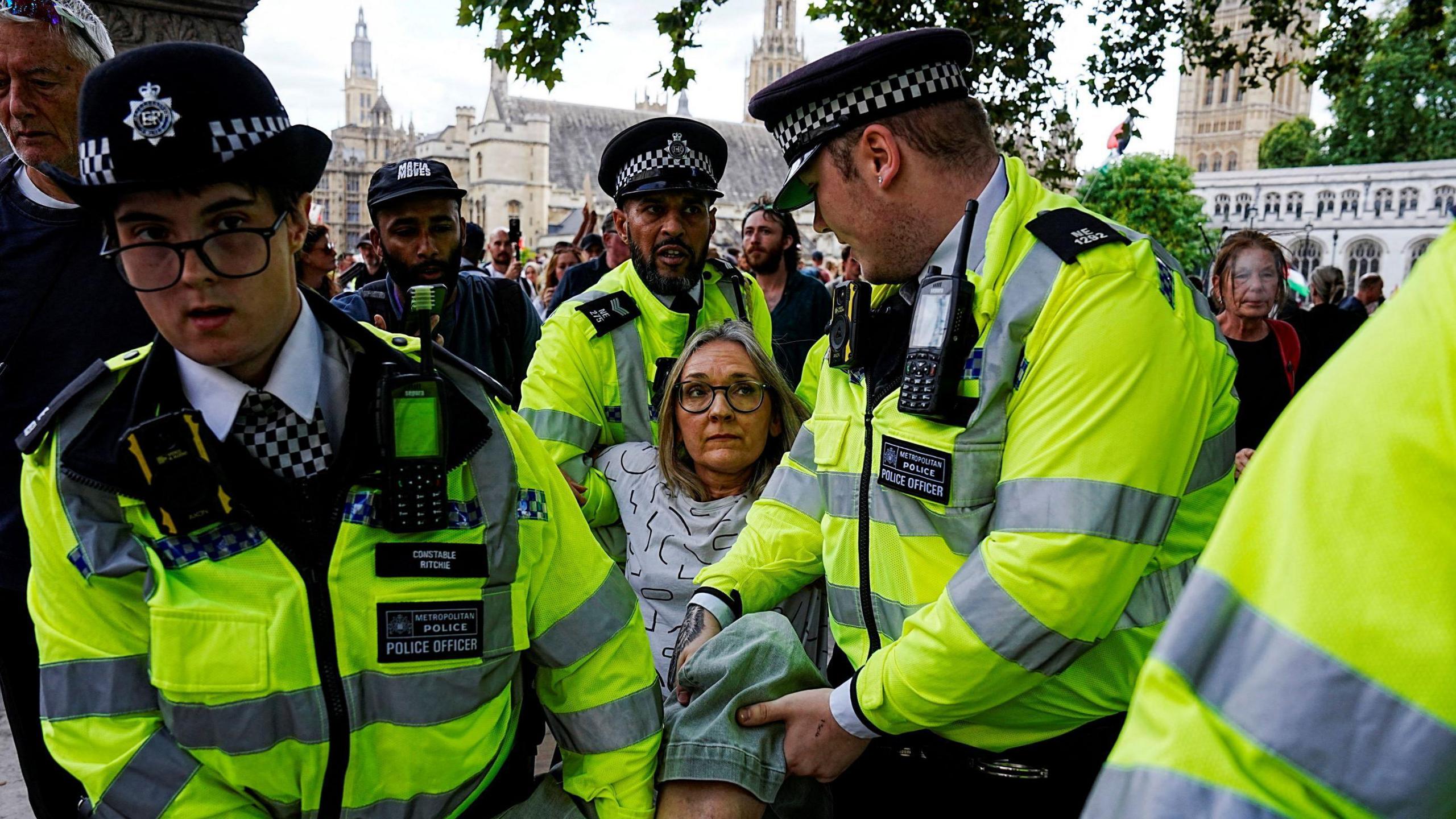
Many protesters were carried away by police during the rally in Parliament Square
The rally officially started as Big Ben struck 13:00. Hundreds of protesters, many of whom were clearly pensioners, picked up pieces of paper or placards and wrote messages in support of Palestine Action.
At the same time, hundreds more stood and watched on in solidarity, but did not hold signs which indicated they supported the banned group.
Approximately 15 minutes after the chimes, police began selecting protesters holding signs and arrested them, one-by-one.
The Met had earlier warned that people showing support for the group would face arrest.
Many protesters followed an instruction from organisers to go "floppy" so that it would be harder for the officers to carry them away.
Each arrest was met by the crowd shouting "shame on you" to the police - and very often more offensive language.
Many of the arrests were made in an area between the statutes of Mahatma Gandhi and Millicent Fawcett, two of the 20th century's' great campaigners for social change.
Once out of the square, each protester was placed in a van and taken to Millbank, a road along the Thames.
It was unclear how many of the demonstrators followed a plan to refuse to give their name and address - which would lead to them being taken into custody, rather than bailed.
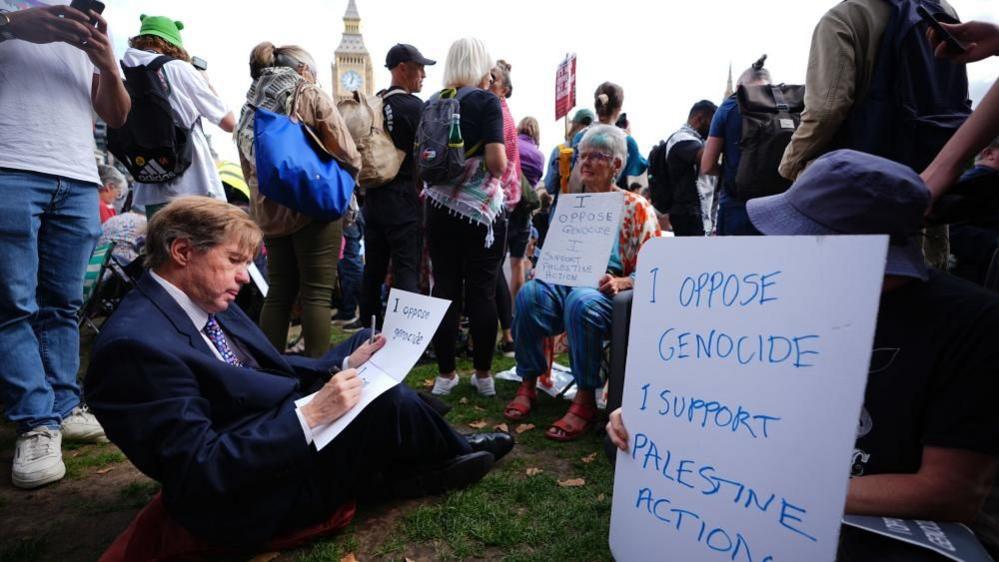
Hundreds of protesters wrote on placards while others watched in solidarity
One protester, 79-year-old Margaret, said she had come from Dorset to take part.
"The law is ridiculous. We need to change the law," she told the BBC as she sat in a camp chair preparing her sign. "We're called terrorists, and it's absolutely stupid."
When asked how she could complain when Palestine Action had been banned by Parliament, she said: "It never should have been done. We've all got to do something about it."
Elsewhere a young man sat quietly as people were being arrested around him. The BBC asked if he understood what it meant to receive a terrorism conviction.
"Of course I have. I'm young. I'm quite happy to accept whatever consequences. The sign says what it says."
In the middle of the the square sat Sir Jonathon Porritt, the veteran environmental campaigner and previously adviser to the King, when he was the Prince of Wales.
"I'm here because I am sick to the heart with what is going on in Gaza and the genocide. I'm outraged with the government's direct complicity and I want to see our government held to account."
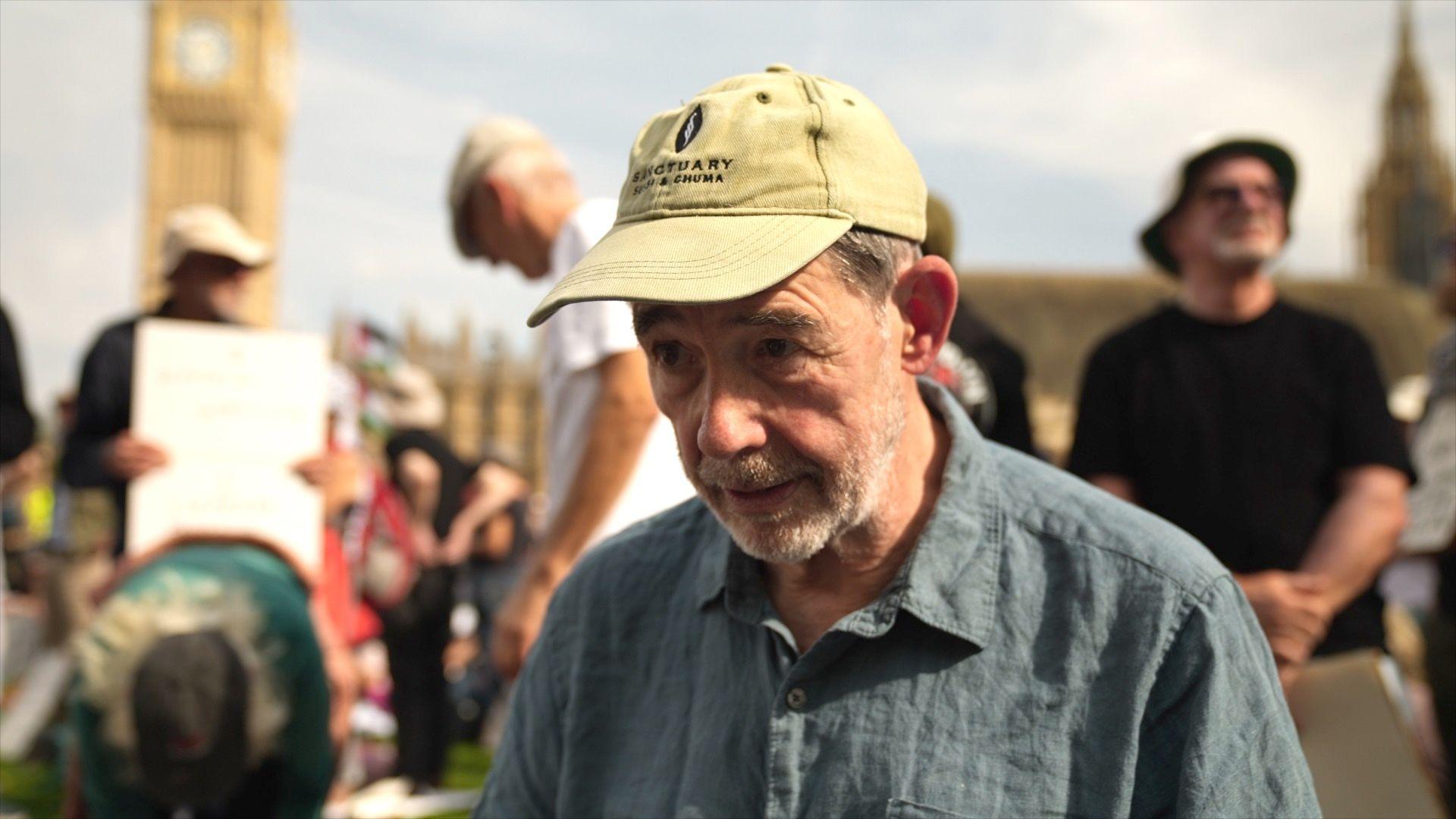
Veteran campaigner Sir Jonathon told the BBC he was "outraged" with the government
Tensions flared between demonstrators and officers, who faced chants of "you're supporting genocide" while they carried out arrests.
The police presence was reinforced partway through the protest, with City of London Police officers joining the Met force in the square.
Organisers estimated on Saturday afternoon that around 1,500 people were "currently defying the ban" in Westminster.
Amnesty International's director of campaigns, Kerry Moscogiuri, said it was "genuinely shocking to see people being hauled from the streets of London by the police for peacefully holding up signs".
"When the government is arresting people under terrorism laws for sitting peacefully in protest, something is going very wrong."
Police Scotland made two arrests at a demonstration in Edinburgh, where dozens of people held signs showing support for Palestine Action.
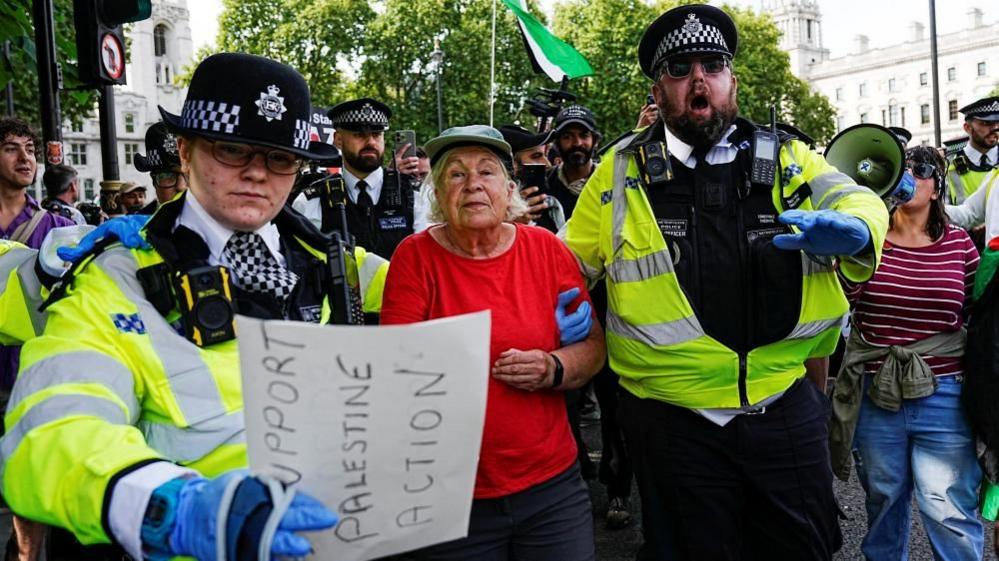
Officers were seen escorting people away through the crowds
Saturday's protest follows a major demonstration last month which saw more than 500 people arrested for displaying placards in support of Palestine Action.
The average age of those arrested at the August rally was 54, and the most arrests - 147 of them - were of people aged between 60 and 69.
Mike Higgins, 62, who is blind and uses a wheelchair, was one of the 532 people arrested at that demonstration. He returned to Parliament Square on Saturday.
"What choice do I have? Nothing is being done about the genocide other than by us," he told the PA news agency.
"And I'm a terrorist? That's the joke of it. I've already been arrested under the Terrorism Act and I suspect I will be today," he added.
Earlier this week, the Home Office was given permission to challenge a ruling which allowed Palestine Action to appeal against its ban under terror legislation.
The group's co-founder, Huda Ammori, was granted permission to appeal in July after her lawyers argued the ban breached the right to free speech.
Former home secretary Yvette Cooper has previously defended the proscription by saying some supporters of Palestine Action "don't know the full nature" of the group.
Cooper was moved to the Foreign Office in a cabinet reshuffle on Friday. Defend Our Juries said her "disastrous" ban "must go with her".
Related topics
- Published4 September
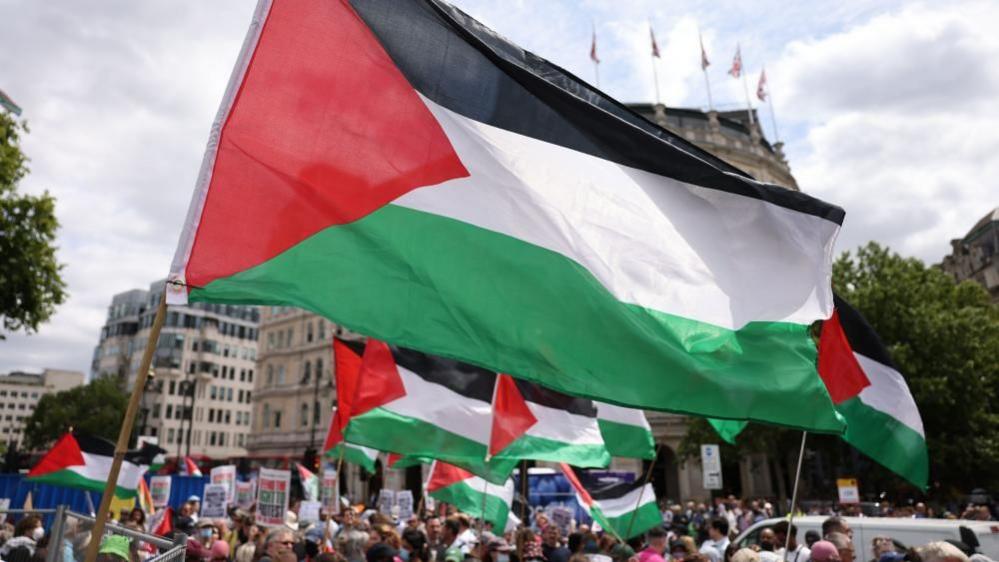
- Published14 August
